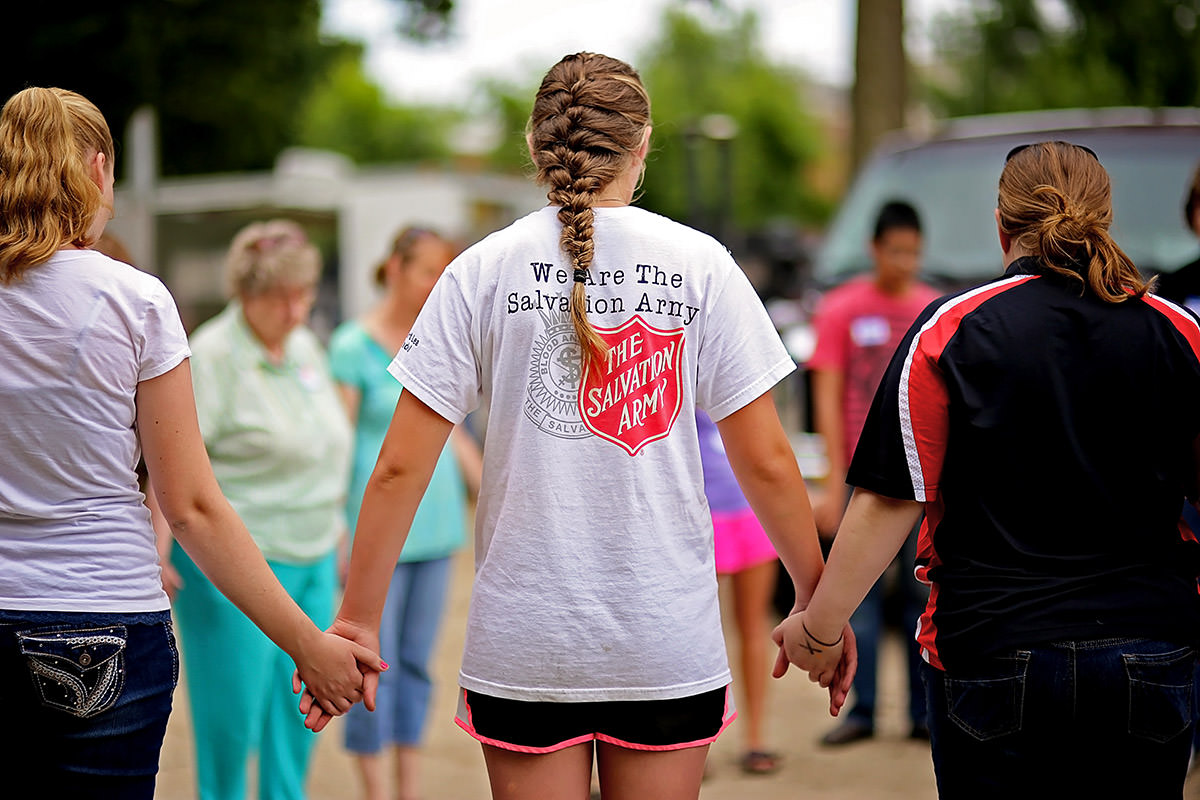Never Miss a Chance to Do the Most Good
Please enter your name, email and zip code below to sign up!
Never Miss a Chance to Do the Most Good
Please enter your name, email and zip code below to sign up!

LGBTQ+ Support
We serve the most vulnerable regardless of age, race, religion, sexual orientation, gender identity, or gender expression. Our hearts, services, and facilities are open to all.
Find a locationHelping those in need is the heart of our mission.
We’re motivated by the love of God to meet human needs in His name without discrimination.
We embrace people regardless of race, gender, ethnicity, sexual orientation, or gender identity.
Our hiring practices are open to all, and we provide the same benefits to opposite-sex and same-sex couples.
The Salvation Army is committed to serving the LGBTQ+ community through:
Homeless Shelters
Each of our homeless shelters, services and programs are available to anyone in need, according to their need and our capacity to help regardless of race, gender, ethnicity, or sexual orientation. Period. And because a majority of homeless LGBTQ+ people are under 18, we take special care of that vulnerable community.
Help with Substance Abuse
According to the Substance Abuse and Mental Health Services Administration, LGBTQ+ adults are more likely than their straight counterparts to abuse substances. The Salvation Army recognizes the need for all people, regardless of income, to have access to rehabilitation programs. Our LGBTQ+-friendly programs provide housing, food, counseling, community, and employment as we work to treat the symptoms and, ultimately, the root causes of prolonged alcohol and drug dependence.
Food Insecurity
More than a quarter of LGBTQ+ Americans are food insecure and rely on the Supplemental Nutrition Assistance Program (SNAP). As one of the nation's largest providers of social services, we understand the importance of helping people maintain their dignity when looking for nutritious food by providing options.
Teenage Suicide
LGBTQ+ youth contemplate suicide at almost three times the rate of heterosexual youth. With a presence in every ZIP code in the nation, we’re committed to providing spiritual and emotional care to those in need regardless of race, gender, ethnicity, sexual orientation, or gender identity.
Job Training
Despite progress toward hiring equality, LGBTQ+ Americans often lack access to educational resources, counseling services, and vocational training to help them obtain well-paying jobs. Our unique programs help LGBTQ+ individuals cultivate vital life skills needed for successful and stable careers.
Hear Our Truth
Questions & Answers:
The LGBTQ+ Community & The Salvation Army
Does The Salvation Army serve anyone in need?
Yes. The Salvation Army’s mission statement is to preach the Gospel of Jesus Christ and to meet human needs in His name without discrimination. Our services are equally available to anyone, and our commitment to provide service without discrimination is an extension of the love of God, who tells us in John 15:12, “This is my commandment: that you love one another as I have loved you.”
Does The Salvation Army serve the LGBTQ+ community?
Yes. Any person who walks through our doors will receive assistance based on their need and our capacity to help. Our mission is to preach the Gospel of Jesus Christ and to meet human needs in His name without discrimination.
What can a person who identifies as LGBTQ+ expect from The Salvation Army?
Our 7,600 service centers across the country are uniquely positioned to meet need, and they do so without discrimination or asking questions about a person’s orientation or beliefs. If we have the capacity to help, we will help. No exceptions.
What is The Salvation Army’s position on diversity?
The Salvation Army supports the Christian conviction that all people are made in the image of God and are equal in value. We believe the world is enriched by a diversity of cultures and ethnicities.
How does The Salvation Army respond to allegations of discrimination?
We take allegations of discrimination very seriously. If you are aware of a specific situation where a person has been the target of discrimination, please contact your Salvation Army leadership, because this is contrary to our mission to “preach the gospel of Jesus Christ and to meet human needs in His name without discrimination.”
How has The Salvation Army committed itself to diversity in its hiring and promotion practices?
The Salvation Army is proud to be an Equal Opportunity Employer, and we provide the same benefits to all of our employees. We welcome and encourage a diverse workforce because it helps us to better serve a diverse community.
What is The Salvation Army’s position on same-sex benefits?
The Salvation Army provides the same benefits to all of its employees, regardless of sexual orientation, gender identity, or gender expression.
Equal Opportunity Employment
The Salvation Army is an Equal Opportunity Employer and committed to providing a respectful environment for all applicants and employees that is free from unlawful discrimination or harassment based on age, race, color, religion, sex, national origin, marital status, disability, citizenship, sexual orientation, gender identity, gender expression, or any other characteristic protected by law. Such equal opportunity for employment will apply to recruitment and hiring, training, promotion, salaries and other compensation, transfers and layoffs or termination.
Non-Discrimination in Programs and Services
In providing its programs and services, The Salvation Army is committed to accommodating all those in need without unlawful discrimination or harassment based on age, race, color, religion, sex, national origin, marital status, disability, citizenship, sexual orientation, gender identity, gender expression, or any other characteristic in accordance with our capacity to help.
